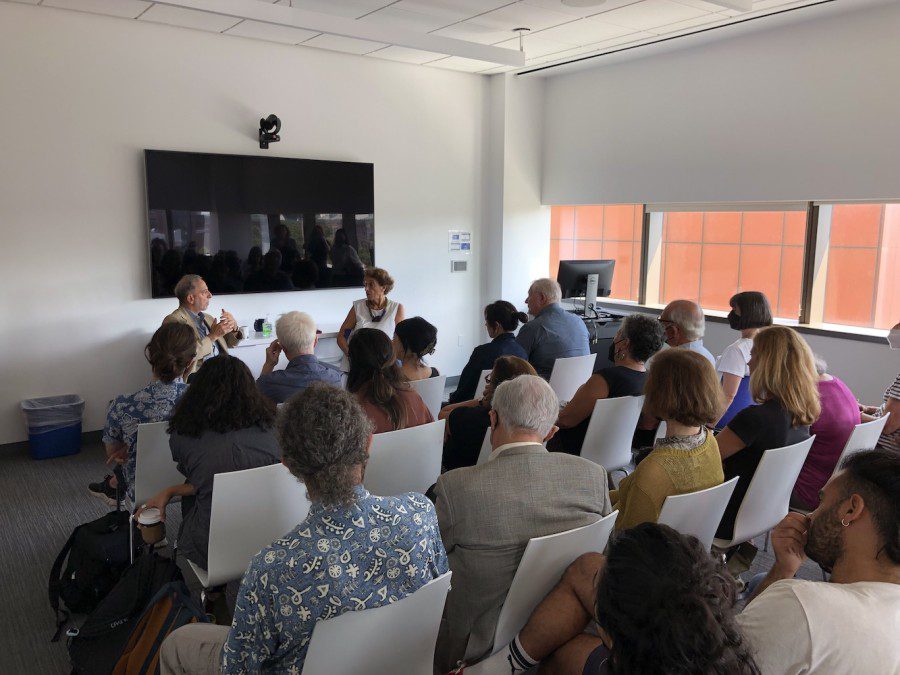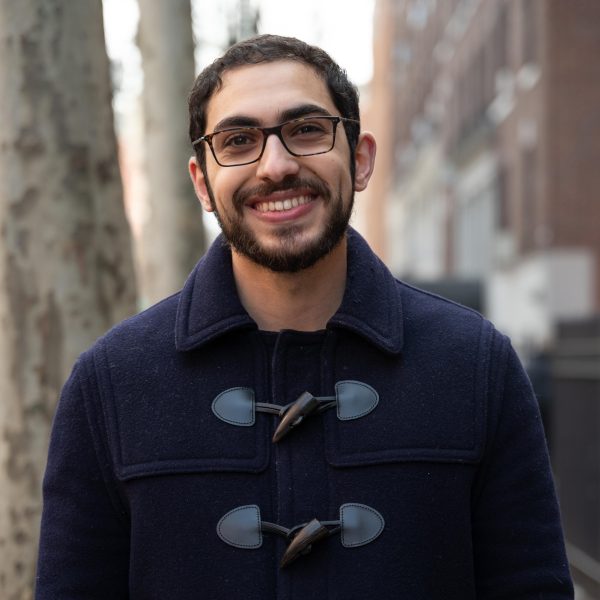Review: Suad Amiry’s ‘Mother of Strangers’ powerfully portrays Palestinian life
Based on a true story, “Mother of Strangers” tells the devastating love tale of Subhi and Shams in Jaffa during the end of British rule in Palestine.
Author Suad Amiry discusses her new novel, “Mother of Strangers,” with Rashid Khalidi, the Edward Said Professor of Modern Arab Studies at the Barnard Center for Research on Women in Columbia University, on Sept. 19. (Courtesy of the Center for Palestine Studies at Columbia University)
October 31, 2022
“Mother of Strangers: A Novel,” by Palestinian writer and architect Suad Amiry, powerfully portrays Palestinian life during the British Mandate — the period between 1918 and 1948 in which Palestine was under British colonial control. Though Amiry was born in Damascus, Syria, her father was from Jaffa, establishing the emotional and personal connection behind the story and the author. In 1948, she and her family became refugees from Jerusalem and immigrated to Amman, Jordan, where Amiry grew up.
The novel follows Subhi Ismael Abu Shehadeh, a 15-year-old mechanic living in Jaffa with his father, Ismael, and two brothers, Jamal and Amir. Subhi’s family has long been tied to the city as Muslim orange farmers, tending and cultivating the bayyarat, or orange groves, throughout Jaffa. However, Subhi is the exception. Amiry writes, “Subhi had followed his passion — or rather, his obsession.”
Growing up, Subhi had always dismantled or reassembled everything in sight, from his grandfather’s radio to his father’s agricultural tools. He developed a knack for inventing — a talent that would eventually drive him to drop out of school to work at a local garage. Largely influenced by industrialization as a byproduct of British colonialism, Subhi’s interest in being a mechanic establishes connections between the industrial movement and westernization.
For Ismael, history and tradition provide the foundations for life, but Subhi drifts away from these tenets. Concerned with preserving Palestinian culture and identity, Ismael focuses on tending to his orange groves.
Subhi’s personal Palestinian narrative relies on the fear — and active embrace — of Western assimilation. Subhi’s perspective reflects the European influence on Palestinian customs, such as his wish for what he considers to be a more modern lifestyle, and especially a desire for an English suit. Subhi’s perception of the English lifestyle is one of modernity, class and luxury. Therefore, when Khawaja Michael — khawaja being an honorific title used to address a man of distinction — promises Subhi an English suit after he fixes his broken water pipe, he is ecstatic.
Over the course of “Mother of Strangers,” Amiry deconstructs the end of British rule in Palestine in 1947, marked by the beginning of Palestinian subjection to Israeli rule in 1948. She depicts demonstrations against British policies as opposition to partition, Jewish immigration and land settlement — a snapshot of the political situation in Palestine at the time. Despite the narrative being character-driven and poetic, the novel is a reflection of the socioeconomic stigma surrounding Palestine and its subsequent effects on the Palestinians.
Though the novel touches on historical themes such as British colonialism and heritage, it is ultimately also a love story. Subhi most notably wants to use his promised suit to impress Shams, a 13-year-old village student he had long been interested in. He characterizes Shams as quiet, shy and indescribably beautiful. From the beginning of the novel, it is clear that Subhi is madly in love with Shams and intends to marry her one day. Expressed as a symbol of hope, Subhi’s enthusiasm for the English suit promises a future with Shams. After being promised the suit, Subhi immediately starts contemplating asking Shams’ hand in marriage. “With such exhilarating news, Subhi’s imagination was instantly at work,” Amiry writes. “He in his eight-pound English suit and she in her white wedding dress.”
Suad Amiry made the New York City stop of her book tour on Monday, Sept. 19, to discuss her book with Palestinian American historian Rashid Khalidi, the Edward Said Professor of Modern Arab Studies at Columbia University. During their conversation, Amiry explained her inspiration for the two protagonists, who are based on real people Amiry met in Jaffa.
“I always felt that Palestinians really concentrate on the collective story,” Amiry said. “We tend to shy away from personal stories. Shams sharing the stories of her time in Jaffa was both tragic and awe-inspiring.”
Amiry’s life-long connection to Palestine deepens the harrowing authenticity of “Mother of Strangers,” allowing for powerful moments of sincerity that strike the reader as unequivocally human.
Contact Yezen Saadah at [email protected].

























































































































































